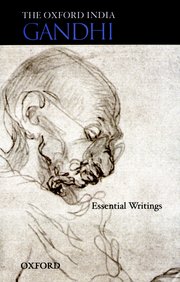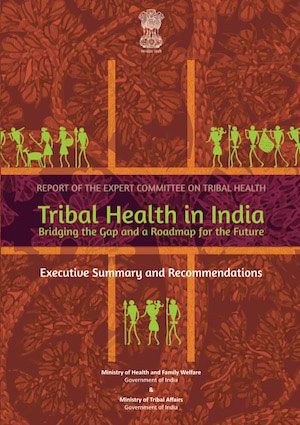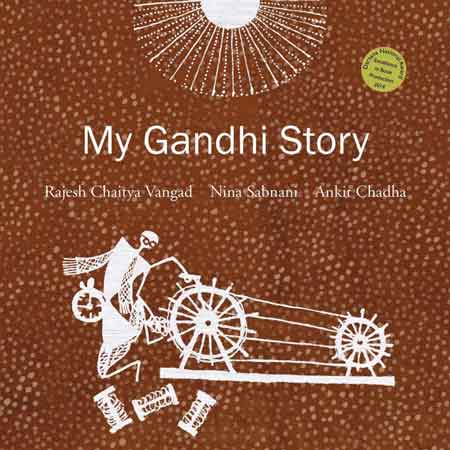
Library copies: Worldcat.org >>
Gandhian social movement >>
“Air is free to all but if it is polluted it harms our health… Next comes water… From now on we must take up the effort to secure water. Councillors are servants of the people and we have a right to question them.” – Mohandas K. Gandhi, Ahmedabad address on 1 January 1918; quoted by his grandson, Gopalkrishna Gandhi, in On another New Year’s Day: Mahatma Gandhi’s ‘khorak’ a 100 years ago | Learn more >>
I. Gandhian Organisations: Striving for Change
Following are the brief sketches of the four organisations which have been covered under the study. All four of them are based in southern part of Gujarat, mainly conducting activities in predominantly tribal areas. […]
i. Gram Seva Samaj, (GSS) Vyara
Gram Seva Samaj, Vyara was established in 1957. Vyara is the Tauka headquarter of Suart District. During the freedom struggle Surat district was the hub for freedom activities. During this period workers of freedom movement who were staying with Mahatma Gandhi at Sabarmati Ashram, Ahmedabad, came to this area as a response to Gandhiji’s plea to go to villages and work for real Swaraj. […]
The Gandhians’ emphasis was on cleanliness and prohibition of non-vegetarian food and liquor. Besides, they had also given importance to ‘Khadi’ and education. The educated tribal leaders were attracted to this ideology. Gandhians with support of tribals and Patidars from Bardoli established number of Ashramshalas on Gandhaian principles. During the period of 1922 to 1947 Ashramshalas spread considerably in this area. At the same time Gandhians also started working on issues like implementation of Land Tenancy Act, Debt-relief Act and Minimum Wages Act for Adivasi landless labourers. Establishing Forest Labour Co-operatives was also one of the major economic programme launched by Gandhians after independence. […]
Activists of GSS in its initial phase worked hard for implementing land tenancy act which gave land occupancy rights to tribals. […]
Today 4945 tribals boys and girls are studying in these Ashram Schools. In last 45 years more than 12 thousand girls and boys got educated through these schools. As a result literacy rate has been increased significantly. […]
ii. Vedchhi Pradesh Seva Samiti, (VPSS) Valod
Vedachhi Pradesh Seva Samiti Valod, was established in the year 1952. As mentioned in the GSS note the activists of VPSS also got sensitize during the freedom struggle. […]
Majority of people are migrating in search for livelihood options to nearby places such as Valsad, Vapi and even Surat. Activist couple of VPSS Mr. Bhikhubhai Vyas and Mrs. Kokilaben Vyas used to visit Dharmpur during eighties for establishing carpet-centre. During their visit they had an opportunity to see the misery and poverty of people living in Dharmpur very closely. Soon they realized that education, employment and basic infrastructure should be given high priority for any developmental work. Initially they started residential school called Chatrashala. These schools are not like formal school but it provides shelter to students. Government schools are there in majority of villages but due to migration most of the children migrate with their parents and thereby are deprived of the school-education. Chatra schools are not just hostels but non-formal schools. […]
VPSS also manages to make people aware about their due rights as citizens.
iii. Sarvoday Parivar Trust, Pindval
Pindval is one of the remotest area of Dharampur Taluka. Surrounded the Pindval village there are 150 villages situated on hilly track of Satpura hill range. Development in this area is very slow. Most of the villages are still inaccessible to road and other basic infrastructural facilities. In 1968-69 some of the Sarvodaya workers came to Pindaval for providing services to the tribals on philanthropic ground. In those days Pindval and surrounded villages were completely cut off from the mainland. Tribals of this area were living in miserable condition. People were not getting food for mere survival. Health was a major problem for tribals. There were untimely deaths of the people. Dr. Navneet Fozdar , a M.B.B.S. from Mumbai heard about this and came to Pindaval and started providing health services to the people. […]
One dedicated woman called Sujata Shah has started developmental activities in the village Kharki and surrounding 15 villages. Sujata has done her M.Sc. in Physics and taught as teacher in higher secondary school. But soon she realized that teaching to well to do students was not her aim. Being a daughter of committed Gandhian and studied at Gandhian ashram school she wanted to go to the tribal villages and served them. […]
Earlier people have to walk for three kms to get water. Now all villagers get it in their house. Villagers are themselves managing entire water works and distribution. Again with the help of people she has managed to stop liquor making distilleries. Today entire village is free from alcoholism which has positive impact on people. People confidently say that our health and economic conditions have improved after giving up alcohol. Training to local youths, panchayat representatives and women of mahila mandal is continues task for her. In each training there is a session on non-violence, peace and justice.
iv. Gandhi Vidyapith, Vedachhi
Gandhi Vidyapith, Vedchhi was established in the 1967 by renowned Gandhian Shri Jugatram Dave. As mention above he and other Gandhians had started ashramshalas and balwadis (Pre-school centres for children) in tribal areas of south Gujarat, providing education and training in accordance with Gandhian method, called nai talim. It soon was realised that institution for higher education was also needed in the area. Gandhi Vidyapith was formally inaugurated by the then President of India Dr. Zakir Hussain. Kakasaheb kalelkar was its first vice-chancellor. The tribal students who have finished their studies till higher secondary in around 70 of Uttar Buniyadi Vidyalas of this region were admitted in Gandhi Vidyapith. From 1967 to 1980 course of Sociology had been offered to the students. Since 1980 this has been changed into three years course of bachelor in Rural Studies (B.R.S). The degree obtain after three years are recognised by Government of Gujarat and are considered at par with bachelor of Arts degree given by ant recognised university.
All the four organisations have been carrying their activities in predominantly tribal areas where people’s lives have become stagnant due to poverty and lack of opportunities. […]
Source: AMAN Panchayat – Gandhian Constructive Activities in Gujarat
Address : http://www.amanpanchayat.org
Date Visited: Tue Mar 20 2012 23:56:24 GMT+0100 (CET)

“I hope that this report will prove to be a milestone in realizing the aim of health and health care to the tribal people of India.” – Abhay Bang, Chairman, Expert Committee on Tribal health
Learn more >>
Download Tribal Health in India PDF (35 MB) >>
Searchable file (backup):
PDF (OCR 70 MB) >>
“[Gandhi] survives more as an image and continues to attract attention based on selectively quoted quotes. However, his singular achievement was formulating what he calls his ‘religion of ahimsa’ [non-violence]. In his own lifetime, he saw the failure of this concept in India and acknowledged this failure.”
Source: “Gandhi has become all things to all people” by Somak Ghoshal, interview with Jyotirmaya Sharma, author of Elusive Non-Violence: The Making And Unmaking Of Gandhi’s Religion Of Ahimsa (Livemint.com, 1 October 2021)
URL: https://lifestyle.livemint.com/news/talking-point/gandhi-has-become-all-things-to-all-people-111633080526074.html
Date Visited: 3 October 2021
“The slogan today is no longer merely ‘Asia for the Asians’ or ‘Africa for the Africans’ but the unity of all the oppressed races of the earth.” – Mahatma Gandhi addressing two stalwarts of the struggle struggle in South Africa against apartheid), quoted by Vinay Lal in The Solidarity of Oppressed Peoples: A Tribute to E S Reddy, Anti-Apartheid Activist >>
“It was assumed that tribal people have same health problems, similar needs and hence the uniform national pattern of rural health care would be applicable to them as well, albeit with some alteration in population: provider ratio. The different terrain and environment in which they live, different social systems, different culture and hence different health care needs were not addressed.” – Abhay Bang in Report of the Expert Committee on Tribal Health >>

Gandhian social movement | Warli art and culture >>
Learn more
Denotified Tribe vs. “criminal tribe“| Imprisonment & rehabilitation
Government of India
President Droupadi Murmu (official website)
National Commission for Scheduled Tribes | Posts
Human Rights Commission (official website) | Posts
Health and nutrition | Recommendations by the Expert Committee
Women | Safe search | President Droupadi Murmu on women’s empowerment